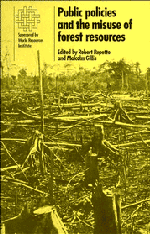Book contents
- Frontmatter
- Contents
- Contributors
- Foreword
- Acknowledgments
- 1 Overview
- 2 Indonesia: public policies, resource management, and the tropical forest
- 3 Malaysia: public policies and the tropical forest
- 4 Incentive policies and forest use in the Philippines
- 5 Price and policy: the keys to revamping China's forestry resources
- 6 Public policy and deforestation in the Brazilian Amazon
- 7 West Africa: resource management policies and the tropical forest
- 8 Subsidized timber sales from national forest lands in the United States
- 9 Conclusion: findings and policy implications
- Index of Topics
9 - Conclusion: findings and policy implications
Published online by Cambridge University Press: 06 July 2010
- Frontmatter
- Contents
- Contributors
- Foreword
- Acknowledgments
- 1 Overview
- 2 Indonesia: public policies, resource management, and the tropical forest
- 3 Malaysia: public policies and the tropical forest
- 4 Incentive policies and forest use in the Philippines
- 5 Price and policy: the keys to revamping China's forestry resources
- 6 Public policy and deforestation in the Brazilian Amazon
- 7 West Africa: resource management policies and the tropical forest
- 8 Subsidized timber sales from national forest lands in the United States
- 9 Conclusion: findings and policy implications
- Index of Topics
Summary
Principal findings
Some low-income nations are confronting a shortage of wood; the world is not. The world is, however, facing a decline of natural tropical forests. Even as policy-makers begin to understand the value of natural tropical forests, they are rapidly shrinking and deteriorating. The studies underlying this volume were neither intended nor needed to verify these problems. Other scientists have clearly established the extent of forest decline and likely economic, social, and environmental consequences (Brown etal. 1985; Eckholm 1976; Fearnside 1982; Grainger 1980; Lanly 1982; Myers 1980, 1984, 1985; Spears 1979).
Many of these and other studies (Allen and Barnes 1985; Bunker 1980; Ehrlich and Ehrlich 1981; Plumwood and Routley 1982; Tucker and Richards 1983) have also established the principal causes of deforestation. They have identified three major outgrowths of population growth and rural poverty – shifting cultivation, agricultural conversion, and fuelwood gathering – as threats to natural forests in the Third World, along with the impacts of large development projects. Virtually all previous studies have also focussed upon commercial exploitation, including logging and land-clearing for ranches, as major sources of the problem.
The studies contained in this volume support these findings. In addition, the authors have identified government policies that have significantly added to and exacerbated other pressures leading to wasteful use of natural forest resources including those owned by governments themselves. We emphasize the policy dimension, because changes in policy can substantially reduce resource wastage. Our emphasis on wasteful use in the economic sense does not ignore or minimize the importance of noneconomic objectives underlying forest policies.
- Type
- Chapter
- Information
- Public Policies and the Misuse of Forest Resources , pp. 385 - 410Publisher: Cambridge University PressPrint publication year: 1988
- 3
- Cited by



